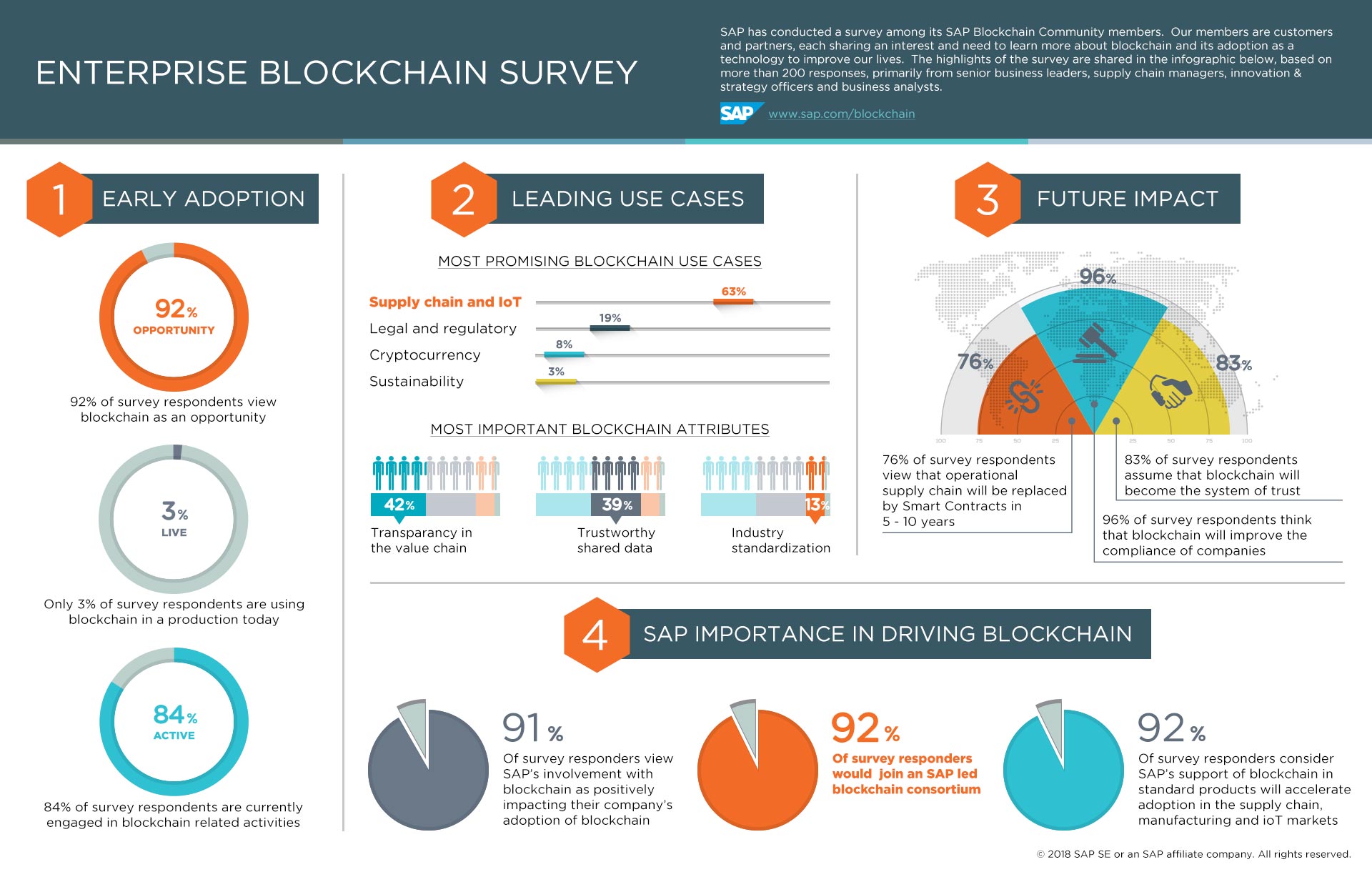A new study from SAP sends this message to the business community about blockchain: It’s time to get real.
The distributed ledger technology blockchain is in the early stages of an adoption cycle where its vast potential is coupled with hype and skepticism. The latest Gartner Hype Cycle for Emerging Technology places blockchain at its “Peak of inflated Expectations,” citing, “Enterprises are still deciding how to navigate this technology, but the lack of proven use cases and the volatility of bitcoin have created concerns about the viability of the technology.
SAP sought to uncover and validate today’s enterprise blockchain realities by studying hundreds of organizations currently engaged in blockchain-related activities. The results of our survey covered the technology’s future promise, current use cases, necessary focus areas to accelerate market adoption and business impact. Importantly, these businesses clearly distinguish and separate the blockchain enterprise reality and impact on their business from the bitcoin hype.
The Present
According to our study, the majority of companies see blockchain innovation coming from vendors in tech and industry, as 88 percent of respondents believe companies in both areas are driving standardization and collaboration. At SAP, we’ve assembled our own network of over 55 co-innovation customers – double the total we previously released four months ago – showing a market that’s exponentially gaining momentum and increasing innovation. Today’s blockchain innovators span industries, generating new use cases every day in pharmaceuticals, consumer products, automotive, agriculture, telecom, retail, logistics, among many others.
The most important attributes of enterprise blockchain use cases are, in order of priority among survey respondents:
- Transparency in the value chain
- Trustworthy shared data
- Industry standardization
The top priorities illustrate an environment designed to capitalize on blockchain’s logistical and transactional advantages. Over the past year, we’ve co-innovated several new scenarios with our co-innovations customers with these gains in mind, including:
- Transportation Management : For all transportation modes and industries, driving a blockchain case for international trade. Sellers, buyers, banks and authorities share, review and sign documents electronically, track process statuses and hand over ownership of the e-bill of lading. A secure container release process will be evaluated to reduce frauds and stolen freight.
- Global Track & Trace : Unified, end-to-end tracking, monitoring and reporting of objects and business processes across supply chain networks. Blockchain technology is used to help make tracking information immutable and tamper-proof for product authenticity and providence. In addition, information stored in the blockchain can be positively traced back to the author/customer/business entity, building the basis for fully automated payment and settlement processes.
- Advanced Track & Trace for Pharmaceuticals : Enabling pharmaceutical supply chain members to comply with global antidrug counterfeit regulations and to facilitate collaboration between supply chain partners in conjunction with SAP Information Collaboration Hub for Life Sciences.
- Farm to Consumer : Food producers and retailers coming together to improve compliance and safeguard brand reputation by increasing confidence in food safety. The effort explores blockchain across the broader food ecosystem both as an effective remedy to product counterfeiting and a way to boost supply chain integrity and efficiency.
The Future
Our study identified participants innovating in the present, but also optimistic about blockchain’s future. Ninety-two percent of respondents viewed blockchain as an opportunity, with the most promising use cases ranked as:
- Supply chain and IoT: 63 percent
- Legal and regulatory: 19 percent
- Cryptocurrency: Eight percent
- Sustainability: Three percent
Across industries, respondents were bullish on blockchain’s future impact on a variety of business challenges:
- Improving corporate compliance: 96 percent
- Becoming the system of trust: 83 percent
- Replacing operational supply chain contracts in five to 10 years: 76 percent
Ultimately, respondents believe blockchain technology will advance farther and faster with the active support and involvement of SAP. Ninety-two percent believe that SAP’s support of blockchain in standard products will accelerate adoption in the supply chain, manufacturing and IoT markets. The same majority would join an SAP-led blockchain consortium.
The numbers don’t lie: blockchain is here to stay, and its vast potential is starting to be realized right now. As we look to the future, we must understand that a wide variety of industry disruption is happening all around us. We’re proud that companies depend on us to guide their blockchain journey – and if you want to help us generate new blockchain use cases, register today to join our efforts.
For more from SAP on the impact blockchain has on the modern supply chain, visit sap.com/blockchain and read the feature story in Digitalist Magazine.
Gil Perez is senior vice president of IoT and Digital Supply Chain at SAP, responsible for developing a range of SAP Leonardo solutions that enable digital transformation.
This story originally appeared on the SAP Innovation Spotlight on Medium .
Email Newsletters
Sign up to receive TelecomTV's top news and videos, plus exclusive subscriber-only content direct to your inbox.




